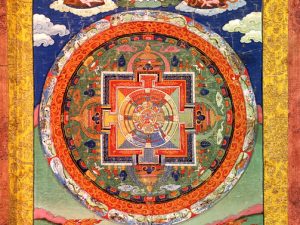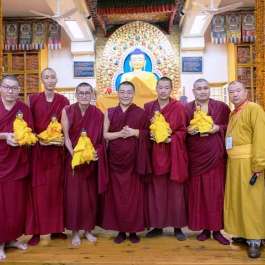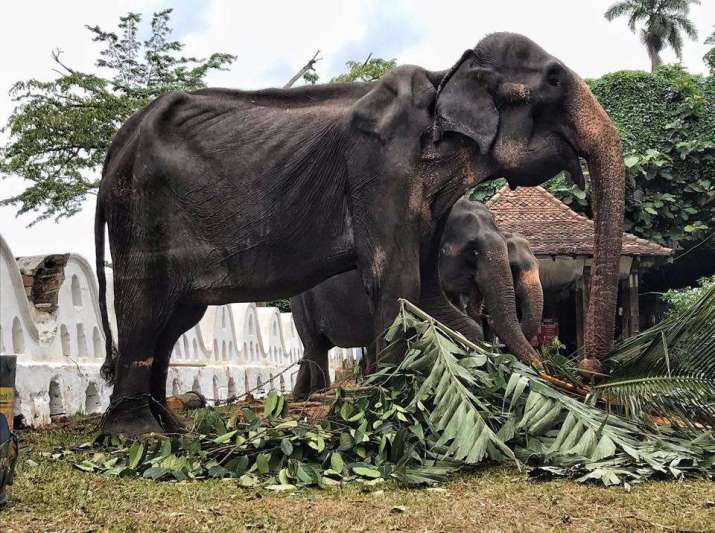
Heartrending images of the abuse of an 70-year-old elephant during a Buddhist festival in Sri Lanka have drawn widespread criticism from animal rights advocates and across social media platforms, following recent reports that the elderly elephant later collapsed from exhaustion after taking part in the annual Esala Perahera festival (also known as the Festival of the Sacred Tooth) in the central city of Kandy.
The emaciated female elephant, named Tikiiri, reportedly collapsed this week after walking many kilometers during nightly parades for the Esala Perahera celebrations while wearing an intricately decorated costume. Media reports indicate that Tikiiri was one of some 60 elephants taking part in the Buddhist festival.
The Esala Perahera festival is celebrated annually with a series of elaborate processions in veneration of a sacred relic, believed to be a tooth of the historical Buddha, enshrined in Sri Dalada Maligawa, the Temple of the Sacred Tooth Relic, in Kandy. Normally held according to the lunar calendar in July–August, this year Esala Perahera ran from 1–15 August. Alongside a host of traditional cultural performances, the processions traditionally feature numerous elephants adorned with ornate garments and decorations.
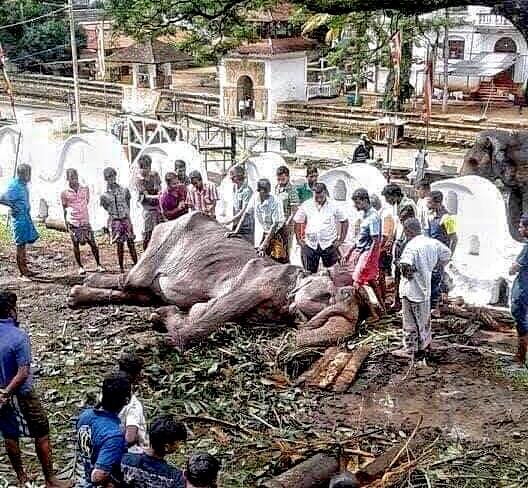
From Save Elephant Foundation Facebook
Photos of 70-year-old Tikiiri were first shared on 12 August, to mark World Elephant Day, by the Thailand-based Save Elephant Foundation, which works to protect Asian elephants in Thailand and across the region. The charity operates a variety of projects, including the Elephant Nature Park, a sanctuary in the northern Thai city of Chiang Mai. Save Elephant Foundation founder Lek Chailert explained that the elephants taking part in Esala Perahera are “short-shackled” to force them to walk slowly during the night parades.
“Tikiiri joins in the parade early every evening until late at night every night for ten consecutive nights, amid the noise, the fireworks, and smoke,” Lek said in a Facebook post. “She walks many kilometers every night so that people will feel blessed during the ceremony. No one sees her bony body or her weakened condition, because of her costume. No one sees the tears in her eyes, injured by the bright lights that decorate her mask, no one sees her difficulty to step as her legs are short shackled while she walks.” (Facebook)
Elephant ownership has long been a symbol of prestige and status among Sri Lanka’s wealthy, and a traditional feature of religious ceremonies in this predominantly Buddhist country. Although it is illegal to own elephants without a government permit, at least 40 elephants have been abducted from the island’s national parks in the last decade, according to the Sri Lankan authorities.* While a 2011 census report showed an increase in Sri Lanka’s elephant population, wildlife conservationists remain concerned that deforestation due to urbanization, the use of wild animals as gifts for VIPs, and ownership of elephants as a status symbol could harm the island’s population of wild elephants.
According a spokesperson for Sri Dalada Maligawa, which organizes the annual festival, Tikiiri suffers from a “digestive ailment” that “prevents her from putting on weight.” However, the spokesperson insisted that Tikiiri’s condition “hasn’t affected her strength and abilities” and she is not as “feeble and unfit” as animal rights activists have asserted. The spokesperson also said that Tikiiri’s owner had “specifically requested” that she take part in the festival in the belief that participation in a puja can cure weak animals. (Metro)
Elephants have been a prominent symbol in Buddhism since the very beginning. Accounts of the historical Buddha’s life relate how his mother dreamed of a white elephant before giving birth to the aspirant Buddha. In a later incident, when two factions of monks became embroiled in a heated argument, the Buddha, exasperated with their quarreling, went into solitary retreat in the forest, where it is said he received sustenance and protection from a monkey and an elephant. Elephants also feature heavily in Theravada Buddhist art, in particular the famous moonstones (sandakada pahana) in ancient Sinhalese architecture—a carved semi-circular stone slab, usually found at the bottom of doorways and staircases. Domesticated wild elephants can also found in many Sri Lankan Buddhist monasteries, where they have played a key role in religious processions for centuries.
Following the international outcry over her condition, Tikiiri was reportedly withdrawn from the closing Esala Perahera parade. The chief custodian of Sri Dalada Maligawa, Pradeep Nilanga Dela, was reported as saying that Tikiiri has been receiving treatment.
However, wildlife conservationists say the authorities need to act more broadly against such abuses.
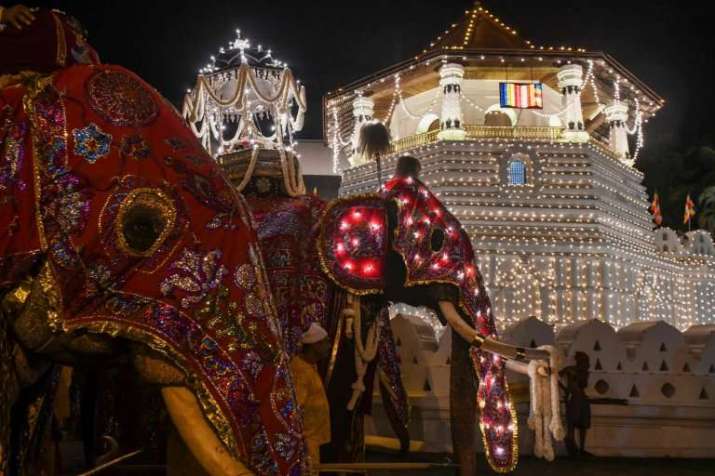
“[The] Sri Lankan authorities must stop allowing such atrocious cruelty and send this poor elephant to a reputable sanctuary where she can be assessed by veterinarians and, if treatment is viable, live out her remaining years in peace,” said Elisa Allen, director of the animal welfare charity PETA, who added that elephants are frequently exploited at tourist attractions and temples in Sri Lanka. (Independent)
Since 2015, the Sri Lankan government has started clamping down on the illegal ownership of elephants—many of which are poached from the wild. In November 2016, Agence France-Presse reported that under the new regulations, violators could lose their ownership licenses and face a jail term of up to three years. In 2017, Sri Lanka’s government introduced tougher legislation aimed at protecting elephants from exploitation, including banning the use of captive elephants under the age of five and ensuring healthy diets for elephants in captivity.**
An online petition urging the prime minister of Sri Lanka to take further action to “end this barbaric torture and abuse” of elephants had at the time of publication gained more than 19,000 signatures from a target of 25,000. “At this stage we are asking people to lobby the Sri Lankan government to take immediate action,” said the Save Elephant Foundation. (CNN)
“For a ceremony, all have the right to belief as long as that belief does not disturb or harm another. How can we call this a blessing, or something holy, if we make other lives to suffer?” said Lek. “To love, to do no harm, to follow a path of kindness and compassion, this is the Way of Buddha. It is time to follow.” (Facebook)
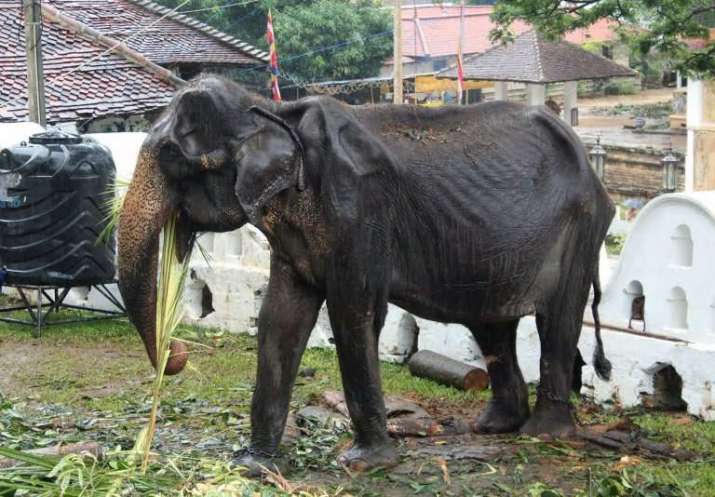
According to a 2011 national census, Theravada Buddhists make up the majority in Sri Lanka, representing some 70.2 per cent of the population. Hindus account for 12.6 per cent, Muslims 9.7 per cent, and Christians 7.4 per cent.
* Sri Lanka Clamps Down on Illegal Ownership of Wild Elephants (Buddhistdoor Global)
** Sri Lanka Approves New Legislation to Protect Elephants (Buddhistdoor Global)
See more
Save Elephant Foundation
Save Elephant Foundation (Facebook)
Save Elephant (Twitter)
Save Tikiiri from barbaric abuse (Change)
Starving 70-year-old elephant collapses from exhaustion after Buddhist festival (Metro)
Starving elderly elephant’s emaciated body is hidden by festival costume (Metro)
Elderly elephant paraded through streets ‘to cure’ emaciated body, say Buddhists (Metro)
Skeletal elephant forced to perform in Sri Lankan parade (Independent)
Campaigners are urging a boycott of Sri Lanka’s elephant attractions after these photos emerged (CNN)







